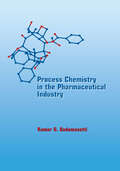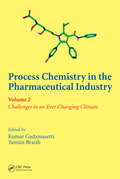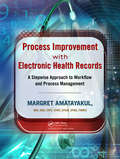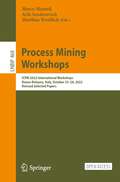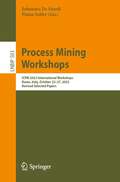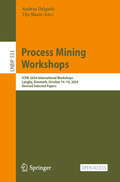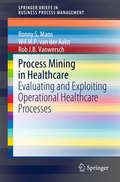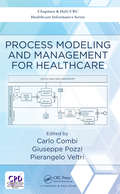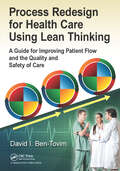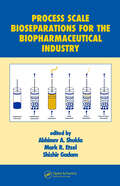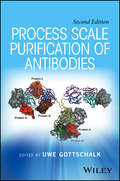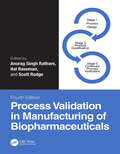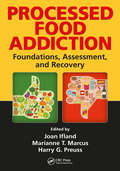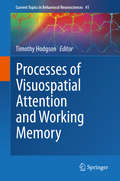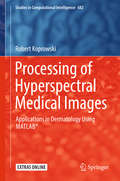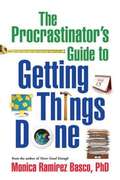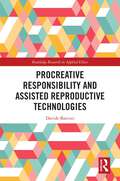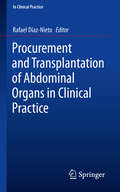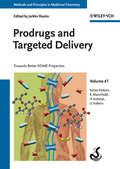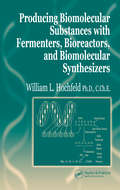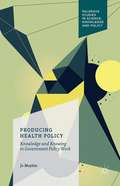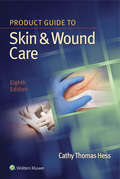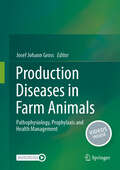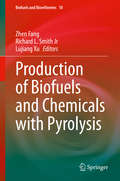- Table View
- List View
Process Chemistry in the Pharmaceutical Industry
by Kumar G. GadamasettiProviding guidance for chemists and other scientists entering pharmaceutical discovery and development, this up-to-the-minute reference presents contributions from an international group of nearly 50 renowned researchers-offering a solid grounding in synthetic and physical organic chemistry, and clarifying the roles of various special
Process Chemistry in the Pharmaceutical Industry, Volume 2: Challenges in an Ever Changing Climate
by Kumar Gadamasetti Tamim BraishAs pharmaceutical companies strive to develop safer medicines at a lower cost, they must keep pace with the rapid growth of technology and research methodologies. Defying the misconception of process chemistry as mere scale-up work, Process Chemistry in the Pharmaceutical Industry, Vol. 2: Challenges in an Ever Changing Climate explor
Process Improvement with Electronic Health Records: A Stepwise Approach to Workflow and Process Management
by Margret AmatayakulAlthough physicians and hospitals are receiving incentives to use electronic health records (EHRs), there is little emphasis on workflow and process improvement by providers or vendors. As a result, many healthcare organizations end up with incomplete product specifications and poor adoption rates.Process Improvement with Electronic Health Records:
Process Improvement with Electronic Health Records: A Stepwise Approach to Workflow and Process Management
by Margret AmatayakulAlthough physicians and hospitals are receiving incentives to use electronic health records (EHRs), there is little emphasis on workflow and process improvement by providers or vendors. As a result, many healthcare organizations end up with incomplete product specifications and poor adoption rates.Process Improvement with Electronic Health Records: A Stepwise Approach to Workflow and Process Management walks you through a ten-step approach for applying workflow and process management principles regardless of what stage your organization is in its EHR journey. Introducing workflow and process mapping as essential elements in healthcare improvement, it includes detailed guidance, helpful tools, and case studies in each chapter. It also: Compares EHR workflow and process management to other continuous quality improvement methodologies Highlights the processes that need to be addressed in EHR workflow and process redesign Describes the level of detail necessary for workflow and process mapping to be effective Explains how to create change agents and offers time-tested change management tools The book describes the process for getting stakeholders to create, document, and validate new workflows and processes. Using case studies to illustrate the unique requirements of health information technology (HIT) and EHR acquisition, this reference provides you with simple yet powerful tools along with step-by-step guidance for the effective use of workflow and process mapping within healthcare.
Process Mining Workshops: ICPM 2022 International Workshops, Bozen-Bolzano, Italy, October 23–28, 2022, Revised Selected Papers (Lecture Notes in Business Information Processing #468)
by Matthias Weidlich Marco Montali Arik SenderovichThis open access book constitutes revised selected papers from the International Workshops held at the 4th International Conference on Process Mining, ICPM 2022, which took place in Bozen-Bolzano, Italy, during October 23–28, 2022. The conference focuses on the area of process mining research and practice, including theory, algorithmic challenges, and applications. The co-located workshops provided a forum for novel research ideas. The 42 papers included in this volume were carefully reviewed and selected from 89 submissions. They stem from the following workshops: – 3rd International Workshop on Event Data and Behavioral Analytics (EDBA)– 3rd International Workshop on Leveraging Machine Learning in Process Mining (ML4PM)– 3rd International Workshop on Responsible Process Mining (RPM) (previously known as Trust, Privacy and Security Aspects in Process Analytics)– 5th International Workshop on Process-Oriented Data Science for Healthcare (PODS4H)– 3rd International Workshop on Streaming Analytics for Process Mining (SA4PM)– 7th International Workshop on Process Querying, Manipulation, and Intelligence (PQMI)– 1st International Workshop on Education meets Process Mining (EduPM)– 1st International Workshop on Data Quality and Transformation in Process Mining (DQT-PM)
Process Mining Workshops: ICPM 2023 International Workshops, Rome, Italy, October 23–27, 2023, Revised Selected Papers (Lecture Notes in Business Information Processing #503)
by Pnina Soffer Johannes De SmedtThis volume constitutes the revised selected papers of several workshops which were held in conjunction with the 5th International Conference on Process Mining, ICPM 2023, held in Rome, Italy, in October 23–27, 2023.The 38 revised full papers presented in this book were carefully reviewed and selected from 85 submissions. The book also contains one invited talk. ICPM 2023 presented the following six workshops:– 4th International Workshop on Event Data and Behavioral Analytics (EdbA)– 4th International Workshop on Leveraging Machine Learning in Process Mining (ML4PM)– 6th International Workshop on Process-Oriented Data Science for Healthcare (PODS4H)– 8th International Workshop on Process Querying, Manipulation, and Intelligence (PQMI)– 2nd International Workshop on Education Meets Process Mining (EduPM)– 2nd International Workshop on Collaboration Mining for Distributed Systems (COMINDS).
Process Mining Workshops: ICPM 2024 International Workshops, Lyngby, Denmark, October 14–18, 2024, Revised Selected Papers (Lecture Notes in Business Information Processing #533)
by Andrea Delgado Tijs SlaatsThis book constitutes the revised accepted papers of several workshops which were held in conjunction with the 6th International Conference on Process Mining, ICPM 2024, held in Lyngby, Denmark, during October 2024. The 56 revised full papers presented in this book were carefully reviewed and selected from 126 submissions. The papers presented in this volume stem from the following workshops: – 9th International Workshop on Process Querying, Manipulation, and Intelligence (PQMI) – 3rd International Workshop on Education Meets Process Mining (EduPM) – 3rd International Workshop on Collaboration Mining for Distributed Systems (CoMinDS) – 5th International Workshop on Leveraging Machine Learning in Process Mining (ML4PM) – 5th International Workshop on Event Data and Behavioral Analytics (EdbA) – 7th International Workshop on Process-Oriented Data Science for Healthcare (PODS4H) – 1st International Workshop on Empirical Research in Process Mining (ERPM) – 1st International Workshop on Generative Artificial Intelligence for Process Mining (GenAI4PM) – 4th International Workshop on Stream Management & Analytics for Process Mining (SMA4PM) – 1st International Workshop on Process Mining for Sustainability (PM4S).
Process Mining in Healthcare
by Ronny S. Mans Wil M. P. van der Aalst Rob J. B. VanwerschWhat are the possibilities for process mining in hospitals? In this book the authors provide an answer to this question by presenting a healthcare reference model that outlines all the different classes of data that are potentially available for process mining in healthcare and the relationships between them. Subsequently, based on this reference model, they explain the application opportunities for process mining in this domain and discuss the various kinds of analyses that can be performed. They focus on organizational healthcare processes rather than medical treatment processes. The combination of event data and process mining techniques allows them to analyze the operational processes within a hospital based on facts, thus providing a solid basis for managing and improving processes within hospitals. To this end, they also explicitly elaborate on data quality issues that are relevant for the data aspects of the healthcare reference model. This book mainly targets advanced professionals involved in areas related to business process management, business intelligence, data mining, and business process redesign for healthcare systems as well as graduate students specializing in healthcare information systems and process analysis.
Process Modeling and Management for Healthcare (Chapman & Hall/CRC Healthcare Informatics Series)
by Carlo Combi Giuseppe Pozzi Pierangelo VeltriFrom the Foreword: "[This book] provides a comprehensive overview of the fundamental concepts in healthcare process management as well as some advanced topics in the cutting-edge research of the closely related areas. This book is ideal for graduate students and practitioners who want to build the foundations and develop novel contributions in healthcare process modeling and management." --Christopher Yang, Drexel University Process modeling and process management are traversal disciplines which have earned more and more relevance over the last two decades. Several research areas are involved within these disciplines, including database systems, database management, information systems, ERP, operations research, formal languages, and logic. Process Modeling and Management for Healthcare provides the reader with an in-depth analysis of what process modeling and process management techniques can do in healthcare, the major challenges faced, and those challenges remaining to be faced. The book features contributions from leading authors in the field. The book is structured into two parts. Part one covers fundamentals and basic concepts in healthcare. It explores the architecture of a process management environment, the flexibility of a process model, and the compliance of a process model. It also features a real application domain of patients suffering from age-related macular degeneration. Part two of the book includes advanced topics from the leading frontiers of scientific research on process management and healthcare. This section of the book covers software metrics to measure features of the process model as a software artifact. It includes process analysis to discover the formal properties of the process model prior to deploying it in real application domains. Abnormal situations and exceptions, as well as temporal clinical guidelines, are also presented in depth Pro.
Process Redesign for Health Care Using Lean Thinking: A Guide for Improving Patient Flow and the Quality and Safety of Care
by David I. Ben-TovimProcess Redesign for Health Care Using Lean Thinking is a response to a simple, but hard to answer, question and is the result of the experiences of a working doctor who was also the chief safety and quality officer of an Australian teaching hospital. At this hospital, he observed that the Emergency Department was staff by talented, well-trained, and respected doctors and nurses. The facilities were modern, and the work load unexceptional, but the department was close to melt down. Bad things were happening to patients, everyone was blaming each other, lots of things had been tried but nothing was getting better and no one could explain why. The problem was not a lack of technical knowledge or expertise, the problem was that no one stood back and said, "what’s the best way to move 200 or 300 patients a day through the complicated and varying, sequence of steps needed to sort out the many different problems that bring patients to our department?" These challenges are faced by hospitals and health services all over the world. There are difficulties with patient flow, congestion, queues, inefficient utilization of resources, problems engaging clinical staff in improvement programs, adverse incidents, and budget constraints. Lean thinking and value stream analysis gives hospitals and health services struggling with these issues the insights they need to help themselves. This book provides a method that systematically turns those insights into working programs of service and system redesign. The book is divided into two sections. The first section gives the background to the approach, and systematically works through the Process Redesign methodology, step-by-step. The second section is a series of case studies that show the methodology in action, what worked and what didn’t work. The goal of any process redesign is simple: the right care, for the right person, at the right time, in the right place, and right the first time. This book helps the people who work in hospitals and health services realize these goals by working together.
Process Scale Bioseparations for the Biopharmaceutical Industry (Biotechnology and Bioprocessing)
by Abhinav A. ShuklaThe biopharmaceutical industry has become an increasingly important player in the global economy, and the success of these products depends on the development and implementation of cost-effective, robust and scaleable production processes. Bioseparations-also called downstream processing- can be a key source of competitive advantageto biopharmaceut
Process Scale Purification of Antibodies
by Uwe GottschalkTraditional column chromatography dominates current purification technology, and many of the productivity gains that have been achieved have relied on upscaling such devices. However, this comes with a cost penalty and the pharmaceutical industry has reached the point at which further upscaling becomes economically unsupportable. This book offers a broad-based reassessment of old and new purification methods, incorporating an analysis of innovative new trends in purification. The book has wide coverage of different antibody purification strategies and brings together top-tier experts to address problems in process-scale antibody purification.
Process Validation in Manufacturing of Biopharmaceuticals (Biotechnology and Bioprocessing)
by Hal Baseman Scott Rudge Anurag Singh RathoreThe fourth edition of Process Validation in Manufacturing of Biopharmaceuticals is a practical and comprehensive resource illustrating the different approaches for successful validation of biopharmaceutical processes. A pivotal text in its field, this new edition provides guidelines and current practices, contains industrial case studies, and is expanded to include in-depth analysis of the new Process Validation (PV) guidance from the US FDA. Key Features: Offers readers a thorough understanding of the key concepts that form the basis of a good process validation program for biopharmaceuticals. Includes case studies from the various industry leaders that demonstrate application of these concepts. Discusses the use of modern tools such as multivariate analysis for facilitating a process validation exercise. Covers process characterization techniques for scaling down unit operations in biopharmaceutical manufacturing, including chromatography, chemical modification reactions, ultrafiltration, and microfiltration, and practical methods to test raw materials and in-process samples. Providing a thorough understanding of the key concepts that form the basis of a good process validation program, this book will help readers ensure that PV is carried out and exceeds expectations. Fully illustrated, this is a much-needed practical guide for biopharmaceutical manufacturers.
Processed Food Addiction: Foundations, Assessment, and Recovery
by Harry G. Preuss Joan Ifland Marianne T. MarcusObesity and eating disorders have stubbornly refused to respond to treatment since the 1990’s. This book organizes the evidence for a possible answer, i.e., that the problem could be one of addiction to processed foods. In a Processed Food Addiction (PFA) model, concepts of abstinence, cue-avoidance, acceptance of lapses, and consequences all play a role in long-term recovery. Application of these concepts could provide new tools to health professionals and significantly improve outcomes. This book describes PFA recovery concepts in detail. The material bridges the research into practical steps that health professionals can employ in their practices. It contains an evidence-based chapter on concepts of abstinence from processed foods. It rigorously describes PFA pathology according to the DSM 5 Addiction Diagnostic Criteria. It applies the Addiction Severity Index to PFA so that health practitioners can orient themselves to diagnosing and assessing PFA. It contains ground-breaking insight into how to approach PFA in children. Because the book is evidence-based, practitioners can gain the confidence to put the controversy about food addiction to rest. Practitioners can begin to identify and effectively help their clients who are addicted to processed foods. This is a breakthrough volume in a field that could benefit from new approaches.
Processes of Visuospatial Attention and Working Memory (Current Topics in Behavioral Neurosciences #41)
by Timothy HodgsonThis volume covers a broad range of current research topics addressing the function of visuospatial attention and working memory. It discusses a variety of perspectives ranging from evolutionary and genetic underpinnings to neural substrates/computational processes and the connection between attention and working memory. Contributions address the topic at the molecular, system and evolutionary scales and will be of interest to a range of audiences from animal behaviour specialists, experimental psychologists to clinicians in the field of psychiatry and neurology.
Processing of Hyperspectral Medical Images
by Robert KoprowskiThis book presents new methods of analyzing and processing hyperspectral medical images, which can be used in diagnostics, for example for dermatological images. The algorithms proposed are fully automatic and the results obtained are fully reproducible. Their operation was tested on a set of several thousands of hyperspectral images and they were implemented in Matlab. The presented source code can be used without licensing restrictions. This is a valuable resource for computer scientists, bioengineers, doctoral students, and dermatologists interested in contemporary analysis methods.
Procrastinator's Guide to Getting Things Done
by Robert Leahy Monica BascoEveryone waits till the last minute sometimes. But many procrastinators pay a significant price, from poor job performance to stress, financial problems, and relationship conflicts. Fortunately, just as anyone can endlessly delay, anyone can learn how to stop! Cognitive-behavioral therapy expert Monica Ramirez Basco shows exactly how in this motivating guide. Dr. Basco peppers the book with easy-to-relate-to examples from "recovering procrastinators"--including herself. Inviting quizzes, exercises, and practical suggestions help you Understand why you procrastinate. Start with small changes that lead to big improvements. Outsmart your own delaying tactics. Counteract self-doubt and perfectionism. Build crucial skills for getting things done today.
Procreative Responsibility and Assisted Reproductive Technologies (Routledge Research in Applied Ethics)
by Davide BattistiThis book rethinks procreative responsibility considering the continuous development of Assisted Reproductive Technologies. It presents a person-affecting moral argument, highlighting that the potential availability of future Assisted Reproductive Technologies brings out new procreative obligations.Traditionally, Assisted Reproductive Technologies are understood as practices aimed at extending the procreative freedom of prospective parents. However, some scholars argue that they also give rise to new moral constraints. This book builds on this viewpoint by presenting a person-affecting perspective on the impact of current and future Assisted Reproductive Technologies on procreative responsibility, with a specific focus on reproductive Genome Editing and ectogenesis. The author shows that this perspective is defensible both from a consequences-based person-affecting perspective and from a person-affecting account that considers morally relevant intuitions and attitudes.Procreative Responsibility and Assisted Reproductive Technologies will appeal to scholars and advanced students working in bioethics and procreative ethics.
Procurement and Transplantation of Abdominal Organs in Clinical Practice (In Clinical Practice)
by Rafael Díaz-NietoThis practical guide provides a full but concise account of the organ donation and transplantation process, from the management of the donor and organ preservation to perioperative management and surgical techniques.Readers will learn about various aspects of multi-organ retrieval such as different types of donors and evaluation of organ donors, as well as the retrieval process itself and ethical aspects of transplantation. Written in a consistent format, each of the themed parts examines the different types of solid organ transplantation, namely kindey, pancreas and liver. Each part discusses the indications for transplantation, organ allocation, surgical technique, post-operative management outcomes and professional skills for the surgeon. This is an essential guide for the transplant surgeon offering a unique summary of the critical issues in abdominal organ transplantation.
Prodrugs and Targeted Delivery: Towards Better ADME Properties (Methods and Principles in Medicinal Chemistry #47)
by Raimund Mannhold Gerd Folkers Hugo KubinyiThis topical reference and handbook addresses the chemistry, pharmacology, toxicology and the patentability of prodrugs, perfectly mirroring the integrated approach prevalent in today's drug design. It summarizes current experiences and strategies for the rational design of prodrugs, beginning at the early stages of the development process, as well as discussing organ- and site-selective prodrugs. Every company employing medicinal chemists will be interested in this practice-oriented overview of a key strategy in modern drug discovery and development.
Producing Biomolecular Substances with Fermenters, Bioreactors, and Biomolecular Synthesizers
by William L. HochfeldContaining authoritative and in-depth coverage, Producing Biomolecular Materials Using Fermenters, Bioreactors, and Biomolecular Synthesizers examines the bioproduction systems that support the controlled, automated, and quantity growth of proteins. The book discusses the substance, character, makeup, and quality of the basic materials used
Producing Health Policy
by Jo MaybinIn this book Jo Maybin draws on rare access to the inner-workings of England's Department of Health to explore what kinds of knowledge civil servants use when developing policy, how they use it and why. Combining ethnographic data with insights from psychology, socio-linguistics, sociology and philosophy, she demonstrates how civil servants engage in a wide range of knowledge practices in the course of their daily work. These include sharing personal anecdotes, thrashing-out ideas in meetings and creating simplified representations of phenomena, as well as conducting cost-benefit analyses and commissioning academic research. Maybin analyzes the different functions that these various practices serve, from developing personal understandings of issues, to making complex social problems 'thinkable', and meeting the ever-present need to make policies 'happen'. In doing so, she develops an original theory of policy-making as the work of building connections between a policy in development and powerful ideas, people, and instruments, and reveals the 'policy know-how' required by civil servants to be effective in their jobs.
Product Guide to Skin & Wound Care
by Cathy HessChoose the best possible skin and wound care products to support your patients’ skin health and wound healing, with the invaluable Product Guide to Skin and Wound Care, 8th Edition. Listing 294 products in alphabetical order, this handy product guide for wound care practitioners across all practice settings offers detailed information—sizes, action, indications, contraindications, application, and removal information—so that your choices stay informed and accurate.
Production Diseases in Farm Animals: Pathophysiology, Prophylaxis and Health Management
by Josef Johann GrossThis textbook deals comprehensively with livestock production diseases and their prevention in the major species: ruminants, swine, and poultry. It gives an interdisciplinary view on pathophysiology, prophylaxis, and health management.Livestock breeding and husbandry is often accompanied by a conflict of interest between the animal´s biological requirements and economic producer needs. This conflict is increasingly gaining attention not only by producers, animal scientists, and veterinarians, but also by the public. It creates significant future challenges, which are described and addressed in this book. The main topics covered are: • the use of antimicrobials with emphasis on security and safety for producers/consumers• the impact of locomotion disorders on performance and welfare of farm animals • the interactions of gut microbiome, genetics, climate change, metabolic status and mineral homeostasis with reproduction, performance, animal health and welfare• infectious and respiratory diseases• the raising of neonatesA special section is devoted to behavioural signs indicating an impaired animal welfare. These are the basis for precision livestock farming (PLF) technology and the development of new management concepts. The present work is a valuable resource for veterinarians, students, as well as expert readers from animal and agricultural sciences, food safety and technology. Supplementary videos can be accessed online as well as directly from the print book; simply download the Springer Nature More Media App for free and scan the links with the play button.
Production of Biofuels and Chemicals with Pyrolysis (Biofuels and Biorefineries #10)
by Richard L. Smith Zhen Fang Lujiang XuThis book presents a collection of studies on state-of-art techniques for converting biomass to chemical products by means of pyrolysis, which are widely applicable to the valorization of biomass. In addition to discussing the fundamentals and mechanisms for producing bio-oils, chemicals, gases and biochar using pyrolysis, it outlines key reaction parameters and reactor configurations for various types of biomass. Written by leading experts and providing a broad range of perspectives on cutting-edge applications, the book is a comprehensive reference guide for academic researchers and industrial engineers in the fields of natural renewable materials, biorefinery of lignocellulose, biofuels, and environmental engineering, and a valuable resource for university students in the fields of chemical engineering, material science and environmental engineering.
